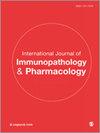IP-10 and complement activation as friend or foe in COVID-19
IF 2.6
3区 医学
Q3 IMMUNOLOGY
International Journal of Immunopathology and Pharmacology
Pub Date : 2022-01-01
DOI:10.1177/03946320221096202
引用次数: 4
Abstract
Introduction The Innate immune system senses danger signals of COVID-19 infection and produce an orchestration of cellular, complement and cytokines cascades. These led to the approach using immunosuppressive agents. It is intriguing whether certain biomarkers can aid the proper administration of such drugs. Methods Plasma specimens of 58 COVID-19 patients with differing severity, from very mild illness (group A), mild (group B), moderate (group C), and severe/critical illness (group D) were assayed for cyto-chemokines and terminal complement complex (SC5b-9) during the course of diseases. None received anti-IL-6 therapy, there was no mortality in this cohort. Results IP-10 and RANTES levels were dominant cytokines. IP-10 levels increased significantly in all groups when compared between pre-nadir and nadir phases (group A, p =0.428; group B =0.034; group C =0.159; group D <0.001) and in groups B and D when compared between nadir and recovery phases (p <0.001). RANTES levels were elevated in all groups across all phases with no significant differences. SC5b-9 levels increased significantly as compared to healthy controls [pre-nadir- group A versus healthy, p =0.122; group B-D versus healthy, p =0.021); nadir-group A versus healthy, p =0.003; group B-D versus healthy, p <0.001; recovery phase (p <0.001)] but not between groups A and B-D at pre-nadir (p=0.606). Conclusion The absence of significant pro-inflammatory responses and early elevation of IP-10 levels and complement activation may be favorable and necessary for viral elimination in COVID-19 patients. Expression of distinct cyto-chemokines during each clinical phase may be useful for guiding proper therapeutic interventions on alleviating thrombo-inflammation responses to COVID-19 infection.IP-10和补体激活在COVID-19中的作用
简介先天免疫系统感知新冠肺炎感染的危险信号,并产生细胞、补体和细胞因子级联的协调。这导致了使用免疫抑制剂的方法。某些生物标志物是否有助于此类药物的正确给药,这一点很有趣。方法对58例新冠肺炎轻、轻、中、重、危重患者(A组)的血浆标本进行细胞趋化因子和终末补体复合体(SC5b-9)检测。没有人接受抗IL-6治疗,该队列中没有死亡。结果IP-10和RANTES水平是主要的细胞因子。IP-10水平在所有组中在最低点前和最低点之间比较时均显著升高(A组,p=0.428;B组=0.034;C组=0.159;D组<0.001),在B组和D组中,在最低点和恢复期之间比较时(p<0.001)。RANTES水平在所有阶段的所有组中均升高,无显著差异。与健康对照组相比,SC5b-9水平显著升高[最低点前-A组与健康组,p=0.122;B-D组与健康,p=0.021);最低点组A与健康组相比,p=0.003;B-D与健康组比较,p<0.001;恢复期(p<0.001)],但在最低点前(p=0.606),A组和B-D组之间没有显著的促炎反应和早期升高IP-10水平和补体激活对于新冠肺炎患者的病毒消除可能是有利和必要的。在每个临床阶段表达不同的细胞趋化因子可能有助于指导适当的治疗干预措施,以减轻新冠肺炎感染的血栓炎症反应。
本文章由计算机程序翻译,如有差异,请以英文原文为准。
求助全文
约1分钟内获得全文
求助全文
来源期刊
CiteScore
4.00
自引率
0.00%
发文量
88
审稿时长
15 weeks
期刊介绍:
International Journal of Immunopathology and Pharmacology is an Open Access peer-reviewed journal publishing original papers describing research in the fields of immunology, pathology and pharmacology. The intention is that the journal should reflect both the experimental and clinical aspects of immunology as well as advances in the understanding of the pathology and pharmacology of the immune system.

 求助内容:
求助内容: 应助结果提醒方式:
应助结果提醒方式:


